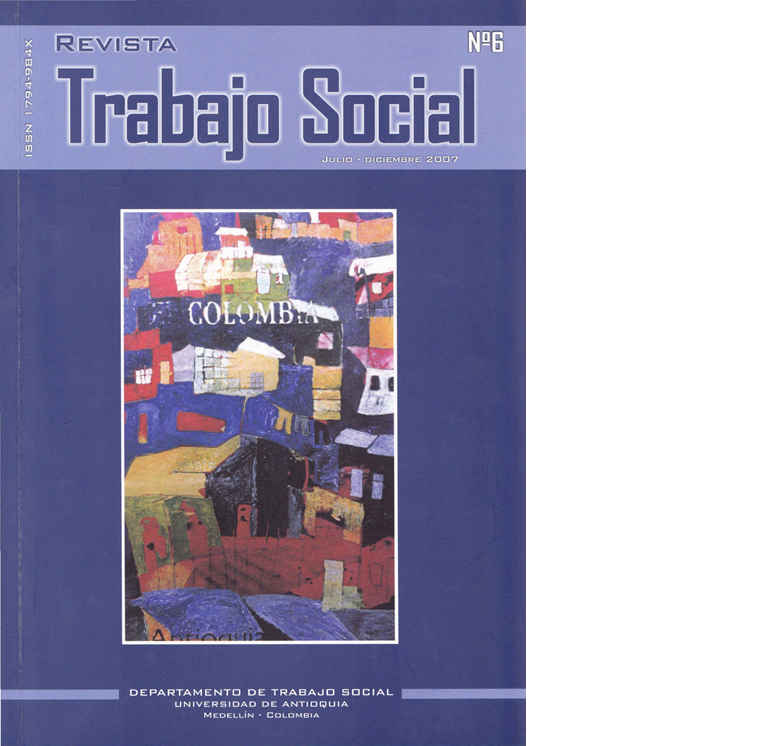La reinvención en Trabajo Social : hacia una intervención en las nuevas ecologías del mundo moderno
Palabras clave:
mundo moderno, complejidad, Trabajo Social, intervención ecologizante, bienestar integral, oportunidades humanasResumen
El Trabajo Social debe enfrentarse a una reforma del pensamiento, que haga proliferar una compleja conciencia ecologizada, apta para quebrantar la miopía de nuestras observaciones en torno a la moderria relación vida-mundo-sociedad-persona. Hablamos de una ruptura intelectual que sea resultado de un original ensamblaje entre episteme, téchne y prhonesis, del cual germine la unión de las inteligencias dispersas, las neutralidades opacas, las propuestas espontáneas, o sea, las posibilidades de provocar una revolución del pensamiento, que emerja del desorden del Trabajo Social mismo. Cometido que precisa asumir un rearme cognitivo, actitudinal y procedimental, que surja en el desarme mismo de nuestra realidad presente, impulsándonos hacia una aventura desconocida que nos haga comprender que la complejidad del mundo moderno tiende a desarmarnos, aprendiendo a pensar la complejidad como requisito fundamental para rearmamos intelectualmente. Esta reinvención radica en la aven- tura de aceptar el advenimiento de la pérdida del futuro, develando el sentido de la ambigüedad y la incertidumbre del devenir, para despertar la conciencia autorreflexiva y la racionalidad autocrítica en el seno de nuestra investigación-intervención, actualmente inmersa en el espacio más complejo de lo contemporáneo. Asunto que nos inquiere a despojarnos de unidimensionalidades simplificadoras, para establecer mediaciones entre la complejidad de lo que aquí llamaremos intervención ecologizante, bienestar integral y oportunidades humanas. Es una necesaria invitación a reconocer que el verdadero progreso del Trabajo Social, solamente es posible si no obedece a ningún requerimiento objetivo, ni depende de garantía histórica alguna, sino que se auto-eco-re-organiza en la hondura de una matriz histórica temporalizada de futuros presentes.
Descargas
Citas
Arendt, Hannah. "La Condición Humana". Barcelona: Editorial Paidós, Ibérica S.A, 1993, p. 18.
Bauman, Zygmunt. "Vida Líquida". Buenos Aires: Editorial Paidós, 2006.
Bourdieu, Pi erre. "Razones Prácticas: Sobre la Teoría de la Acción". Barcelona: Editorial Ana-grama, 1997, p. 19
Guattari, F. "Las Tres Ecologías". Valencia: Editorial Pre-Textos, 1990, pp. 20, 73
Kottak, Conrad. ''Antropología Cultural: espejo para la humanidad". Madrid: Me Graw Hill, 1997.
Maturana, Humberto. "Los Sistemas Sociales". Santiago de Chile: Editorial Universitaria, 1992.
Morin, Edgar. El Espíritu del Valle y La Complejidad de la Complejidad, El Método: la Naturaleza de la Naturaleza, Tomo l. Madrid: Ediciones Cátedra, 1999, pp. 21-39, 425-436.
____ . Sociología", Barcelona: Editorial Gedisa, 2000, p. 152.
____ . "El Pensamiento Ecologizado", "El Método: la Vida de la Vida", Tomo II. Madrid: Ediciones Cátedra, 1998, pp. 101-111.
____ . "Introducción a una Política del Hombre". Barcelona: Editorial Gedisa S.A., 2002, _ pp. 133-146.
____ ."Por una Teoría del Cambio", E.: 2000., pp., 173-182.
____ ."Los Siete Saberes Necesarios para la Educación del Futuro". Barcelona: Editorial Paidós, 2002, p. 131. ·
___ ."La Mente Bien Ordenada". Barcelona: Editorial Seix Barra!, 2001, pp. 43-57.
___ . "El Método: la humanidad de la humanidad, la identidad humana" Tomo V. Madrid: Ediciones Cátedra, 2003, p. 45.
Prigogine, Ilya y Stengers, Isabelle. "Entre el Tiempo y la Eternidad". Madrid: Editorial Alianza, 1994, p. 202.
Yáñez Pereira, Víctor R. "Visibilidad/Invisibilidad del Trabajo Social: los fundamentos de una cosmología disciplinaria". Buenos Aires: Editorial Espacio, 2007, pp. 40-43.
Descargas
Publicado
Cómo citar
Número
Sección
Licencia
Derechos de autor 2021 Revista Trabajo Social

Esta obra está bajo una licencia internacional Creative Commons Atribución-NoComercial-CompartirIgual 4.0.




